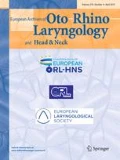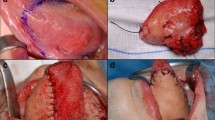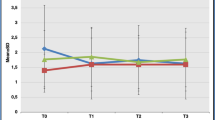Abstract
Background
The senses of smell and taste can be adversely affected by both tumour- and treatment-related factors amongst head and neck cancer patients. The consequences may negatively impact nutritional status as well as quality of life in this patient population.
Patients and methods
This prospective longitudinal follow-up study is consisted of 44 patients treated for oral cavity, oropharyngeal or hypopharyngeal cancer with tumour resection and microvascular free tissue transfer reconstruction at the Helsinki University Hospital, Helsinki, Finland. Thirty-nine (89%) of them also received radiotherapy. The senses of smell (odour detection, identification and threshold test) and taste (electrogustometry) and quality of life (UW-QOL) were evaluated preoperatively, and at 6 weeks, 3 months, 6 months and 12 months, postoperatively.
Results
There were higher scores in the odour detection values in the 6-week and 3-month tests compared with preoperative values for the tumour side. Other detection scores did not differ statistically from the preoperative values neither in the tumour nor the contralateral side. However, in the odour identification test, all posttreatment values were statistically significantly higher than pretreatment ones. In the olfactory threshold test, no statistically significant differences were found between pre- and posttreatment values. Electrogustometry values for the taste on the tumour side were statistically significantly impaired at 6 weeks (p < 0.05) and at 3 months (p < 0.01) compared with the pretreatment results. They were also impaired at 6 months and at 12 months, although the differences were not statistically significant. The quality of life was impaired after treatment in this patient series. However, the correlation between quality of life and sense of taste was found only at one time point (3 months) and only with contralateral side measurements.
Conclusions
We conclude that in oral and pharyngeal cancer patients the postoperative taste problems are related to the impairment on the taste sensation in the tongue but not with the sense of smell. Moreover, the impairment in the quality of life is not clearly related to the impaired sense of taste.




Similar content being viewed by others
References
de Bree R, Rinaldo A, Genden EM, Suarez C, Rodrigo JP, Fagan JJ et al (2008) Modern reconstruction techniques for oral and pharyngeal defects after tumor resection. Eur Arch Otorhinolaryngol 265(1):1–9
Markkanen-Leppanen M (2006) Functional outcome after free flap reconstructions in oral and pharyngeal cancer. Thesis. University of Helsinki, Helsinki, Finland. URN:ISBN:952-10-3047-X
Epstein JB, Barasch A (2010) Taste disorders in cancer patients: pathogenesis, and approach to assessment and management. Oral Oncol 46(2):77–81
Bhattacharyya N, Kepnes LJ (2015) Contemporary assessment of the prevalence of smell and taste problems in adults. Laryngoscope 125(5):1102–1106
Hong JH, Omur-Ozbek P, Stanek BT, Dietrich AM, Duncan SE, Lee YW et al (2009) Taste and odor abnormalities in cancer patients. J Support Oncol 7(2):58–65
Epstein JB, Smutzer G, Doty RL (2016) Understanding the impact of taste changes in oncology care. Support Care Cancer 24(4):1917–1931
Halyard MY (2009) Taste and smell alterations in cancer patients—real problems with few solutions. J Support Oncol 7(2):68–69
Farmer MN, Raddin RS, Roberts JD (2009) The relationship between taste, olfaction, and nutrition in the cancer population. J Support Oncol 7(2):70–72
Amoore JE, Ollman BG (1983) Practical test kits for quantitatively evaluating the sense of smell. Rhinology 21(1):49–54
Amoore JE, O’Neill RS (1986) Clinical olfactometry: improved convenience in squeeze-bottle kits; and a portable olfactometer. Chem Senses 11:576
Markkanen-Leppanen M, Makitie AA, Haapanen ML, Suominen E, Asko-Seljavaara S (2006) Quality of life after free-flap reconstruction in patients with oral and pharyngeal cancer. Head Neck 28(3):210–216
Yamashita H, Nakagawa K, Tago M, Nakamura N, Shiraishi K, Eda M et al (2006) Taste dysfunction in patients receiving radiotherapy. Head Neck 28(6):508–516
Mirza N, Machtay M, Devine PA, Troxel A, Abboud SK, Doty RL (2008) Gustatory impairment in patients undergoing head and neck irradiation. Laryngoscope 118(1):24–31
Sandow PL, Hejrat-Yazdi M, Heft MW (2006) Taste loss and recovery following radiation therapy. J Dent Res 85(7):608–611
Mossman K, Shatzman A, Chencharick J (1982) Long-term effects of radiotherapy on taste and salivary function in man. Int J Radiat Oncol Biol Phys 8(6):991–997
Frye RE, Schwartz BS, Doty RL (1990) Dose-related effects of cigarette smoking on olfactory function. JAMA 263(9):1233–1236
Simola M, Malmberg H (1998) Sense of smell in allergic and nonallergic rhinitis. Allergy 53(2):190–194
Ho WK, Kwong DL, Wei WI, Sham JS (2002) Change in olfaction after radiotherapy for nasopharyngeal cancer—a prospective study. Am J Otolaryngol 23(4):209–214
Holscher T, Seibt A, Appold S, Dorr W, Herrmann T, Huttenbrink KB et al (2005) Effects of radiotherapy on olfactory function. Radiother Oncol 77(2):157–163
Jackson JA (1967) Heavy smoking and sodium chloride hypogeusia. J Dent Res 46(4):742–744
Uota M, Ogawa T, Ikebe K, Arai Y, Kamide K, Gondo Y et al (2016) Factors related to taste sensitivity in elderly: cross-sectional findings from SONIC study. J Oral Rehabil 43(12):943–952
Ellegard EK, Hay KD, Morton RP (2007) Is electrogustometry useful for screening abnormalities of taste? J Laryngol Otol 121(12):1161–1164
Stillman JA, Morton RP, Hay KD, Ahmad Z, Goldsmith D (2003) Electrogustometry: strengths, weaknesses, and clinical evidence of stimulus boundaries. Clin Otolaryngol Allied Sci 28(5):406–410
Acknowledgements
The authors thank Timo Pessi, MSc for performing the statistical analyses.
Funding
This study was funded by the Helsinki University Hospital Research Fund (Grant number TYH2015204).
Author information
Authors and Affiliations
Corresponding author
Ethics declarations
Conflict of interest
All authors declare no conflict of interest.
Ethical approval
All procedures performed in this study involving human participants were in accordance with the ethical standards of the institutional research ethics committee and with the 1964 Helsinki declaration and its later amendments or comparable ethical standards. The Research Ethics Board approved the study design and an institutional study permission was granted.
Informed consent
All patients filled in an informed consent form.
Rights and permissions
About this article
Cite this article
Lilja, M., Markkanen-Leppänen, M., Viitasalo, S. et al. Olfactory and gustatory functions after free flap reconstruction and radiotherapy for oral and pharyngeal cancer: a prospective follow-up study. Eur Arch Otorhinolaryngol 275, 959–966 (2018). https://doi.org/10.1007/s00405-018-4883-x
Received:
Accepted:
Published:
Issue Date:
DOI: https://doi.org/10.1007/s00405-018-4883-x




